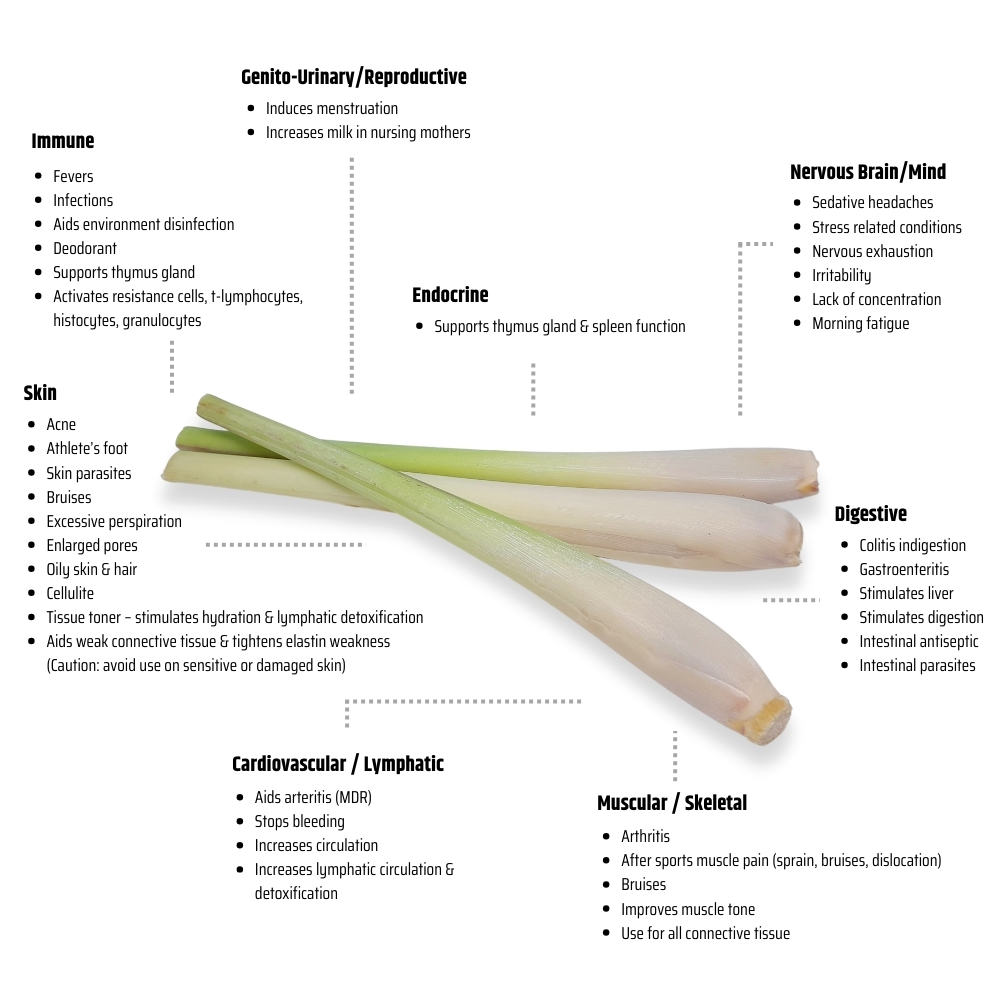
Australian Owned and Operated We have been proudly running for over 30 years

100% Pure & Natural Our products are sourced from the highest quality suppliers and growers from around the world

Not Tested on Animals None of our products are tested on animals

Vegan Friendly Our products are plant based and vegan friendly
Organic Lemongrass
Cymbopogon flexuosus
Source: Organic Leaves
Origin: India
Energetics: Yin
Extraction Method: Steam Distilled
Scent: Fresh, citrusy, and invigorating, reminiscent of lemon with a hint of earthiness.
Blends Well With: Lavender, Eucalyptus, Peppermint, Tea tree, Geranium, Bergamot, Rosemary, Cedarwood and Patchouli.
About
Lemongrass essential oil, extracted from the Cymbopogon citratus plant, is celebrated for its refreshing citrus scent and versatile health benefits. With its invigorating aroma, Lemongrass oil is cherished for its ability to uplift mood, promote mental clarity, and reduce feelings of stress and fatigue. Its natural astringent and antimicrobial properties make it a popular choice for skincare, helping to cleanse and tone the skin while promoting a clear complexion. Additionally, Lemongrass oil is valued for its digestive support, aiding in digestion and alleviating symptoms of bloating and indigestion. Whether diffused, applied topically, or used in massage blends, Lemongrass essential oil offers a revitalising and aromatic experience, making it a favourite among natural health enthusiasts.
Ayurvedic Uses
In Ayurveda, Lemongrass essential oil, known as "Gavati Chaha Taila," is highly regarded for its therapeutic properties and is commonly used to balance the "Kapha" dosha. With its citrusy and refreshing aroma, Lemongrass oil is believed to uplift the senses and promote mental clarity, making it beneficial for reducing feelings of lethargy and promoting focus. Its warming and stimulating properties aid in digestion and metabolism, supporting overall digestive health and vitality. Lemongrass oil is also valued for its purifying and detoxifying effects, helping to cleanse the body of toxins and promote overall well-being. Additionally, it is used in skincare for its astringent and antibacterial properties, promoting clear and healthy skin.
Historical Snippets
Lemongrass essential oil has a rich history dating back centuries, with origins rooted in Southeast Asia and the Indian subcontinent. Historically, lemongrass has been used in traditional medicine and culinary practices across various cultures. It was valued in Ayurveda for its medicinal properties and was used to alleviate digestive issues, fever, and skin conditions. Lemongrass was also cherished in Southeast Asian cuisine for its distinct citrusy flavor and aroma. Additionally, its fragrant leaves were often used to brew teas and infusions for their refreshing and invigorating qualities. Over time, lemongrass gained popularity in the West, where it became a staple in aromatherapy and natural health remedies.
Key Constituents
- Citral (Geranial and Neral)
- Limonene
- Myrcene
- Geraniol
- Citronellal
- Citronellol
- Geranyl acetate
- Nerol
- Linalool
- Camphene
How To Use
Diffuse: Add a few drops to a diffuser to disperse around the room
Topically: Dilute essential oil with any carrier oil at a 2.5% ratio. This equates to 2.5ml essential oil/oils in total mixed with 100ml of chosen carrier oil. 1ml of essential oil is approximately 20-22 drops of oil. Decant into a roller or glass bottle with eye dropper to apply easily or a larger bottle if using for massage. Please note this dilution rate is for adults and children over the age of 6. More information on children and essential oils is on our blog page. Essential Oils should not be used directly on the skin without mixing first with a carrier oil
Inhalation: Add 1-2 drops essential oil to a tissue and inhale at a distance while ensuring that the oil does not come into direct contact with the skin. Alternatively, you can smell the oil directly from the bottle.
Shelf Life
Our freshly decanted Organic Lemongrass essential oil will last for 2-3 years minimum from when you open your amber glass bottle if stored correctly.
Primary Storage Considerations: Keep away from direct light (U.V. radiation). Keep in the amber glass bottle with lid tightly closed. Only open when you need to and decant into a smaller "working" amber glass bottle if possible (and label so you know what is in it). This is to reduce oxidation.
Secondary Storage Considerations: Keep in a refrigerator at around 4 degrees celsius.
Safety
General
Some essential oils may cause photosensitivity to the skin - Use diluted in Jojoba or other complete carrier oil.
Do not ingest essential oils.
Do not apply to eyes, sensitive areas or mucous membranes.
The information on this website is not intended to be used in the diagnosis, treatment or mitigation of any physical or mental illness. Ahimsa Oils offer no advice or recommendations only general information. No therapeutic claims are made within.
Pregnant women, nursing mothers and children should not use essential oils without first consulting an appropriately trained healthcare practitioner.
The statements on this website have not been evaluated by the TGA. David Bosley however worked for a long period in consultation with the TGA to ensure correct labelling with reference to the Ahimsa Oil product range.
Specific
Hazards: Drug interaction; teratogenicity, skin sensitization.
Cautions: Drugs metabolized by CYP2B6, Hypersensitive, diseased or damaged skin, children under 2 years of age.
Maximum dermal level: 0.7%
A dermal maximum of 0.7% is recommended to avoid skin sensitization and based on 90% citral content with a dermal limit of 0.6%.
References
Tisserand, R., & Young, R. (2014). Essential Oil Safety: Second edition



 Available for $100 orders and over
Available for $100 orders and over

